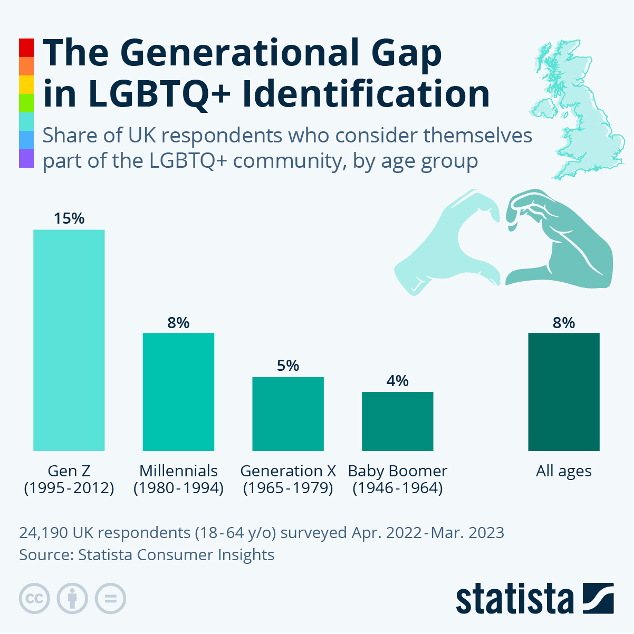Young vs. Old: A Battle of the Ages
Results of surveys recently published in the United Kingdom suggest that there has been a shift between attitudes of younger and older people in society. As much as 8 percent of people in the UK may now identify as one of the letters in LGBTQ+.
The number seems to be going up because 15 percent of Generation Z identifies as LGBTQ+. The older generation, the baby boomers, still believe that 4 percent is sufficient—they believe this percentage is "right"—because LGBTQ+, in their minds, is still about sexual orientation. That's my guess.
What does 'identify' mean, anyway? 'Identity' and the physiological responses of sexual orientation are not the same thing.
This increase in the number of people who identify as LGBTQ+ may be what is at the root of all the social noise and argument over gender. Younger and older people are not going to agree on everything. They may hardly agree on anything at all, so why should they agree on 'gender', or perceptions of who they are, or who they want to be?
Do political parties develop policies for emerging generations of people they hope to represent? Or do they develop policies that attempt to point both younger and older generations to a compromised 'view of reality' that is somewhere in the middle of the argument over gender? Is there a substantive argument over gender, or just differences of emphasis and language?
It could not have escaped anyone's attention in Australia that The Greens party in Victoria is tearing itself apart over how to reconcile trans rights and women's rights. For the time being, women's rights don't seem very important.
Source: https://archive.md/aY6OP
It's possible that the same problem exists between young and old in the LGBT community. When Peter Tatchell and Bev Jackson debated gender issues on UK television recently, Mr. Tatchell argued that gender-critical issues were mostly the narrow concern of older gays and lesbians. He asserted that the success of Pride marches was proof that the gay community does not have a problem in the conflict between trans-women and lesbians.
However, Pride marches are self-selecting. The people who go to them are happy to go to them. The people who feel left out don’t go and are left out. Fred Sergeant was being provocative when he took a placard that suggested an equivalence between black-face and woman-face. However, he had a right, I think, to express that view - anywhere, anytime.
That's not what people at Pride marches feel these days. We know this because Fred Sargent was attacked and ended up being taken to a hospital. Should we be proud about this? If you’re a gender activist, the answer is Yes. If you’re an older gay man or lesbian, or if you just think that it's ok for people to have different opinions than you, the answer is No.
We could discuss forever who is erasing whom, and whose existence is threatened. The claims about this are mostly drama. One way of looking at Fred’s quiet protest is to conclude he’s just not proud of what the LGBTQ+ community is doing—to itself, to women, to children, and to everyone else that now has to endure the never-ending debate. That might be another good reason Pride marches are self-selecting, and their commercial and social success is a sign of nothing more than that citizens of LGBTQ+land are more divided than ever.
Here's another problem … The young don't want to talk, and the old want to make sure that the talk happens before the change. It's a choice between recklessness and conservatism, and it's a choice that is deeply embedded in the psychological characteristics, good and bad, that drive the conflict between generations.
Old people drive too slowly. Young people are reckless.
If this difference of view is happening in the debate over gender, and the laws relating to gender recognition, then it must also be happening in families, between parents and their children. It may very well have started within families before anywhere else. Is it any wonder then that some parents of trans children are among the most vocal, most emotional, and most effective proponents of gender recognition laws, and that some parents aren’t? They have had that discussion (or fight) already.
An opinion article for LGB Alliance Australia by Justin Ian


